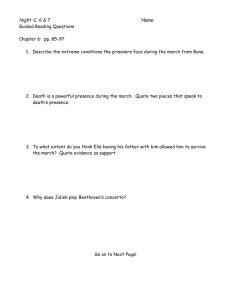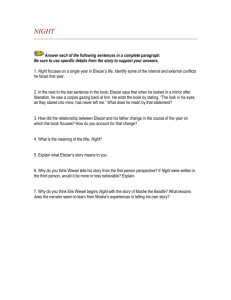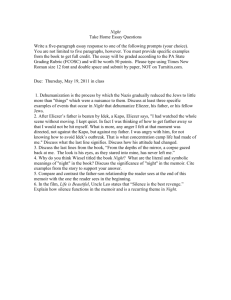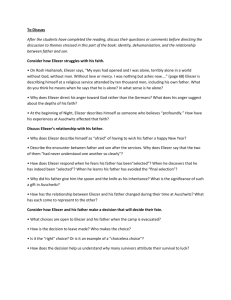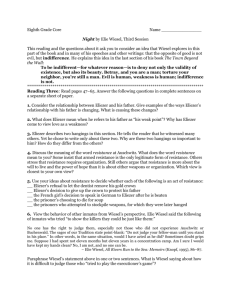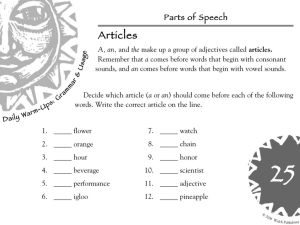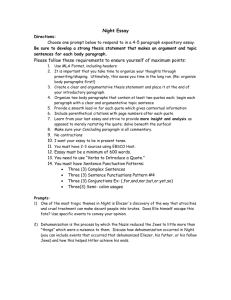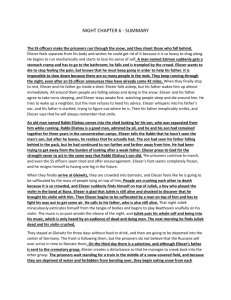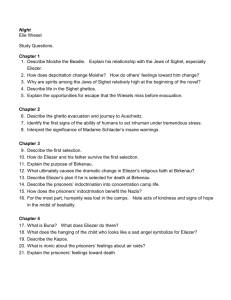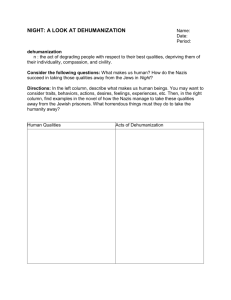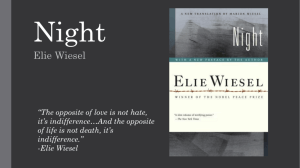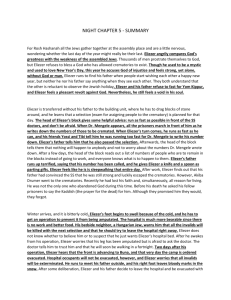Night Comprehension and Discussion Questions
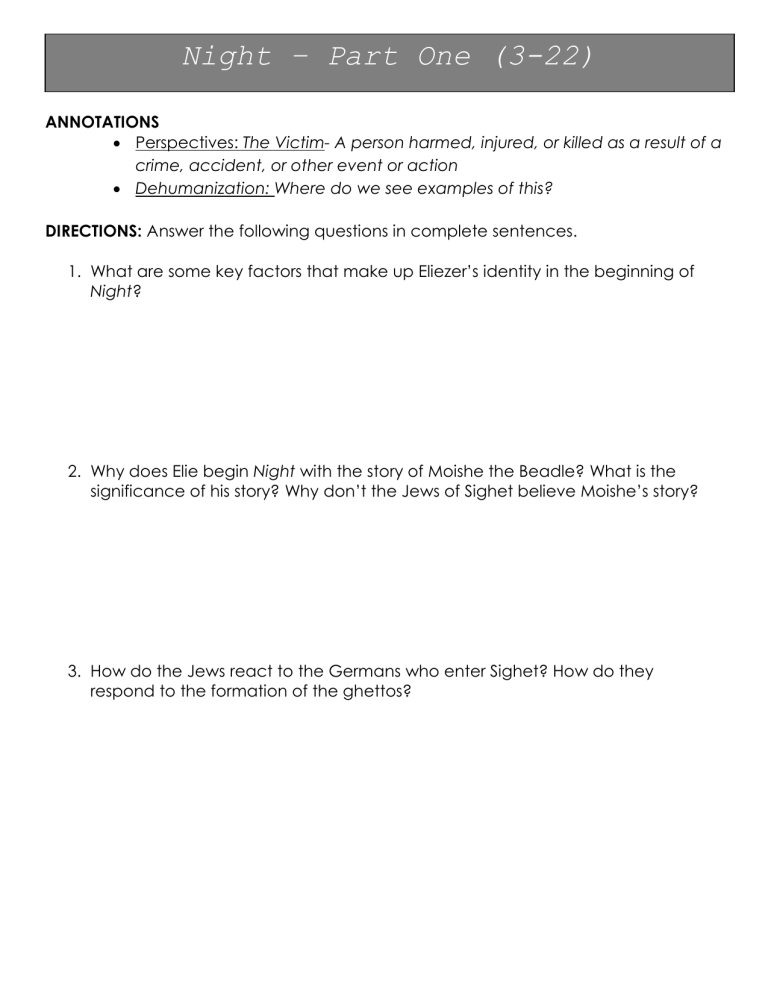
Night – Part One (3-22)
N
ANNOTATIONS
Perspectives: The Victim- A person harmed, injured, or killed as a result of a crime, accident, or other event or action
Dehumanization: Where do we see examples of this?
DIRECTIONS: Answer the following questions in complete sentences.
1.
What are some key factors that make up Eliezer’s identity in the beginning of
Night?
2.
Why does Elie begin Night with the story of Moishe the Beadle? What is the significance of his story? Why don’t the Jews of Sighet believe Moishe’s story?
3.
How do the Jews react to the Germans who enter Sighet? How do they respond to the formation of the ghettos?
CLASS DISCUSSION
Analyze: With your groups, discuss the following quesitons and record your answers below using evidence from the novel.
1. In what ways are the Sighet Jews becoming victims?
2. Why do some victims resist oppression and others passively accept it?
The Power of Words
Chose a quote in part one to represent the victimization occuring at this point in the novel.
Quote: _____________________________________________________________________
_____________________________________________________________________________
_____________________________________________________________________________
Night – Part Two (23-46)
N
ANNOTATIONS
Perspectives: The Perpetrator- A person who carries out or commits a harmful, illegal, or immoral action
Dehumanization: Where do we see examples of this?
DIRECTIONS: Answer the following questions in complete sentences.
1.
What are the conditions on the Jews’ train journey? How do the people in the cattle car respond to Madame Schächter’s screams? What does it reveal about human nature?
2.
What drastic change does Eliezer undergo during his first night in
Auschwitz? What does he witness that causes this change?
3.
What specific strategies do the Nazis employ to create fear/terror in the prisoners? List as many as you can.
SECTION 2: CLASS ACTIVITY
Dehumanization
DIRECTIONS: In the chart below, list the strategies the Nazis used to dehumanize the prisoners.
How did they effectively strip the prisoners of their identities?
STRATEGIES
(What did the Nazis do?)
EXPLANATION
(What was the strategy effect? How did it work to dehumanize?)
*Why do you think it is necessary for the Nazis to dehumanize the prisoners and strip them of their identites in order to achieve their intended outcome? ________________________________
__________________________________________________________________________________________
__________________________________________________________________________________________
__________________________________________________________________________________________
__________________________________________________________________________________________
Night – Part Three (47-65)
N
ANNOTATIONS
Perspectives: Upsanders – Resistor: A person who strives against, opposes, or fights back against perpetrators.
Acts of Humanity: Where do we see examples of this?
DIRECTIONS: Answer the following questions in complete sentences.
CHANGING IDENTITY
1.
How is Eliezer’s relationship with his father changing? What circumstances prompt these changes?
2.
How has love become a “weak point” for Eliezer?
RESISTANCE:
1.
What is your definition of “resistance?”
A. Armed B. Organized C. The will to live D. The will to hope
Resistance is … (brainstorm ideas/components/definitions)
2.
Why did they hang those prisoners publicly when they were killing thousands of prisoners every day?
3.
Why don’t more people resist?
GROUP STATEMENT
Using your ideas about what constitutes resistance, discuss the following acts with your group and decide whether or not they are acts of resistance. Be prepared to share your responses with the class.
Eliezer’s refusal to allow the dentist to take his gold crown
His decision to give the crown up to protect his father
The French girl’s decision to speak to Eliezer in German after he is beaten
The prisoner’s decision to risk death for soup
The prisoners who stockpiled weapons for which they were later hanged
For the acts your group identified as acts of resistance, who or what were the prisoners resisting? What factors do you think enabled the person(s) to resist?
_____________________________________________________________________________
_____________________________________________________________________________
_____________________________________________________________________________
_____________________________________________________________________________
_____________________________________________________________________________
_____________________________________________________________________________
_____________________________________________________________________________
Night – Part Four (66-84)
ANNOTATIONS
Perspectives: The Bystander- A person who is present at an event or incident but does not take part.
Acts of Humanity vs. Dehumanization: Where do we see examples of this?
DIRECTIONS: Answer the following questions in complete sentences.
1.
How does Eliezer struggle with his faith? How do his experiences in Auschwitz impact his faith? How has it changed from the beginning of the book?
2.
During the Rosh Hashanah service, he says, “I was alone --- terribly alone in a world without God and without man. Without love or mercy” (p. 65). What does he mean when he says he’s alone? How has God and man abandoned him?
3.
Why does Eliezer direct his anger toward God? What does this anger suggest about his faith?
4.
How has his changing faith and his changing relationship with his father changed Eliezer’s identity?
GROUP STATEMENT:
The following is a quote from Martin Niemoeller, a Lutheran minister. It is engraved on the New England Holocaust Memorial:
THEY CAME FIRST for the Communists, and I didn’t speak up because I wasn’t a Communist.
THEN THEY CAME for the Jews, and I didn’t speak up because I wasn’t a Jew.
THEN THEY CAME for the trade unionists. and I didn’t speak up because I wasn’t a trade unionist.
THEN THEY CAME for the Catholics, and I didn’t speak up because I was a Protestant.
THEN THEY CAME for me, and by that time no one was left to speak up.
What does it mean to be a bystander in the face of evil? To allow it to proceed? How does this quotation affect our understanding of what happened during the
Holocaust? Why did individuals and groups allow these things to happen? How might we prevent them from happening again?
_____________________________________________________________________________
_____________________________________________________________________________
_____________________________________________________________________________
_____________________________________________________________________________
_____________________________________________________________________________
_____________________________________________________________________________
_____________________________________________________________________________
_____________________________________________________________________________
_____________________________________________________________________________
____________________________________________________________________________
N
Night – Part Five (85-115)
ANNOTATIONS
Perspectives: Upstanders: The Rescuer- A person who helps to save, free or protect victims.
Acts of Humanity vs. Dehumanization: Where do we see examples of this?
DIRECTIONS: Answer the following questions in complete sentences.
1.
In this section of the book, Eliezer recounts tales of three father/son relationships.
He tells of the son who kills his own father for a piece of bread, of Rabbi Eliahou and his son, and of his own father and himself. What effect do the other two stories have on his relationship with his father? How do these stories affect his reactions to his father’s continuing decline of strength and health? How do the stories impact his view of his identity as his father’s son?
2.
Why does Juliek play the violin on his deathbed? What does the music mean to
Eliezer? To Juliek? Is it an act of resistance? If not, what is it? If so, against whom/what is Juliek resisting?
3.
How does Elie change after his father’s death? Use quotes with explanations to respond. a.
What does he mean when he says he feels free after his father’s death?
Free from what? Free to do what? b.
What does he mean when he says, “nothing could touch me anymore?”
4.
What does the very last sentence mean?
5.
Why is it so important for Elie to remember and tell his story? What purpose does it serve for him? For us?
The Power of Words
Now that you have completed the book, record one quote that really stood out to you.
Quote: _____________________________________________________________________
_____________________________________________________________________________
_____________________________________________________________________________
_______________________________________________________________ Page: ______
Why was this quote so powerful. Explain your reasoning below.
_____________________________________________________________________________
_____________________________________________________________________________
_____________________________________________________________________________
_____________________________________________________________________________
_____________________________________________________________________________
_____________________________________________________________________________
